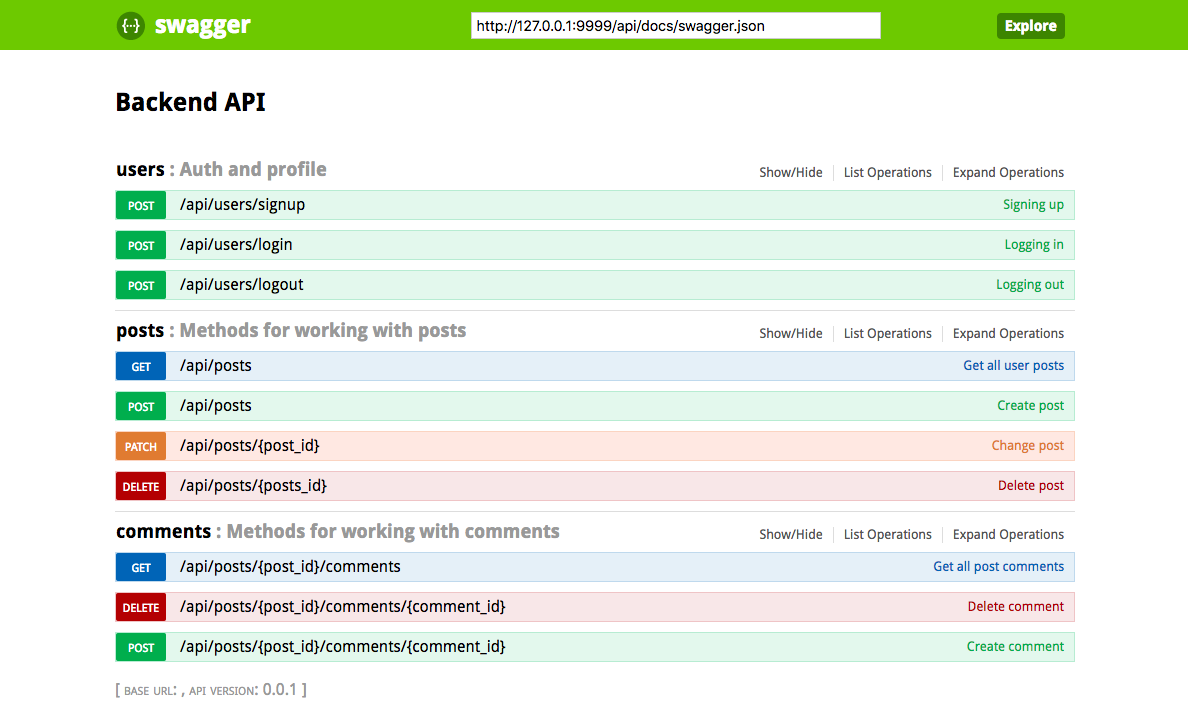aiohttp-apispec
Build and document REST APIs with aiohttp and apispec
aiohttp-apispec key features:
docs,use_kwargsandmarshal_withdecorators to add swagger spec support out of the boxaiohttp_apispec_middlewaremiddleware to enable validating with marshmallow schemas from those decorators
aiohttp-apispec api is fully inspired by flask-apispec library
Install
pip install aiohttp-apispec
Quickstart
from aiohttp_apispec import docs, use_kwargs, marshal_with, AiohttpApiSpec
from aiohttp import web
from marshmallow import Schema, fields
class RequestSchema(Schema):
id = fields.Int()
name = fields.Str(description='name')
bool_field = fields.Bool()
class ResponseSchema(Schema):
msg = fields.Str()
data = fields.Dict()
@docs(
tags=['mytag'],
summary='Test method summary',
description='Test method description',
)
@use_kwargs(RequestSchema(strict=True))
@marshal_with(ResponseSchema(), 200)
async def index(request):
return web.json_response({'msg': 'done', 'data': {}})
# Class based views are also supported:
class TheView(web.View):
@docs(
tags=['mytag'],
summary='View method summary',
description='View method description',
)
@use_kwargs(RequestSchema(strict=True))
def delete(self):
return web.json_response({'msg': 'done',
'data': {'name': self.request['data']['name']}})
app = web.Application()
app.router.add_post('/v1/test', index)
app.router.add_view('/v1/view', TheView)
# init docs with all parameters, usual for ApiSpec
doc = AiohttpApiSpec(
app=app, title='My Documentation', version='v1', url='/api/docs/api-docs'
)
# now we can find it on 'http://localhost:8080/api/docs/api-docs'
web.run_app(app)Adding validation middleware
from aiohttp_apispec import aiohttp_apispec_middleware
...
app.middlewares.append(aiohttp_apispec_middleware)Now you can access all validated data in route from request['data'] like so:
@docs(
tags=['mytag'],
summary='Test method summary',
description='Test method description',
)
@use_kwargs(RequestSchema(strict=True))
@marshal_with(ResponseSchema(), 200)
async def index(request):
uid = request['data']['id']
name = request['data']['name']
return web.json_response(
{'msg': 'done', 'data': {'info': f'name - {name}, id - {uid}'}}
)Build swagger web client
aiohttp-apispec adds swagger_dict parameter to aiohttp web application after initialization.
So you can use it easily with aiohttp_swagger library:
from aiohttp_swagger import setup_swagger
...
async def swagger(app):
setup_swagger(
app=app, swagger_url='/api/doc', swagger_info=app['swagger_dict']
)
app.on_startup.append(swagger)
# now we can access swagger client on /api/doc url
TODO List before 1.0.0 can be released:
- Generating json spec from marshmallow data schemas
- Kwargs/marshal_with decorators for request/response schemas and docs decorator for connecting schemas to swagger spec with additional params through aiohttp routes
- Data validation through additional middleware (built using webargs)
- 97% more cov with tests
- Documentation on readthedocs
- More simple initialisation - register method is not needed. Instead of it we can use some middleware to register all routs on app start
- Class based views support
- Nested apps support
- Flexible settings for
aiohttp_apispec_middlewaremiddleware (like request param name and error handling)




